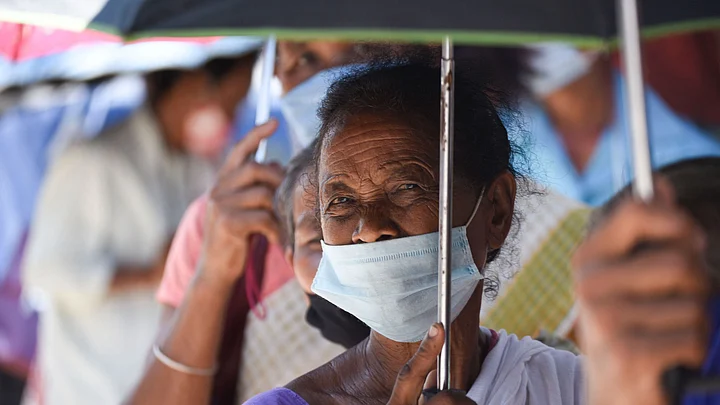The underfunding of the public health system in India has only deepened inequalities among socio-economic groups in the Covid-19 pandemic, a new report by Oxfam India revealed.
The accessibility to healthcare, food supplements and immunization is fragmented along the lines of gender, caste, religion, location and economic standing, the 'India Inequality Report 2021' points out.
The report says the general category performs better than the SC and ST communities, Hindus were found to perform better than Muslims, the rich perform better than the poor, men are better off than women and the urban population is better off than the rural population.
But the COVID-19 pandemic has exacerbated the health inequalities further due to the weak public healthcare system, exploitative private players and inadequate government interventions that have failed to incorporate the specific needs of the poor and the marginalised groups in its action plans.
Rural Indian houses especially faced devastating effects of the second wave owing to its poor health infrastructure. While it accounts for 70 percent of India's population, it only has 40 percent of the beds in the country.
Over 50 percent of SCs and STs faced difficulties in accessing non-Covid medical facilities compared to 18.2 percent in the general category, the report said.
Among female respondents, 33.9 percent experienced anxiety, irritation and anger, and sleep deprivation during the lockdown as compared to 18.2 percent males.
“Persistent underfunding of public health system especially primary health care and inadequate health infrastructure in India remain to be addressed by the government even after devastating second wave. Otherwise, health emergencies will only aggravate existing inequalities and work as a detriment for the poor and the marginalised. Declaring health as a constitutional right can help to bridge these gaps."Amitabh Behar, CEO, Oxfam India
Higher Funding Can Reduce Inequalities
While factors like physical distancing and maintaining proper hygiene play a big part in reducing Covid infections, the report also said that those states that have higher expenditure on health showed a higher recovery rate.
Three states — Assam, Bihar and Goa which have higher GDP expenditure on health showed the highest recovery rate among Indian states, and Telangana which has the highest reduced inequality reported less confirmed cases of Covid.
The report also states that Kerala has made remarkable strides in advancing its healthcare.
The state recorded the highest Human Development Index among the Indian states in 2011 owing to its low Infant Mortality and Maternal Mortality Rates and highest literacy rate.
"Its success on the health front can be attributed to investment in infrastructure, decentralized governance and community engagement with a special focus on public health and primary healthcare," the report read.
'Right to Health' Needs to be A Fundamental Right
Despite the urgent need to improve health expenditure in the Covid pandemic, the health budget for 2021-22 has declined by 9.8 percent from revised estimates of 2020-21.
"The current health status of the country is a testament to the unfulfilled dream of ‘Health for All’. The right to the highest attainable health is far from being realised. Even after one year into the pandemic and facing two COVID-19 waves, Government of India has repeated its failure to allocate 2.5% of Gross Domestic Product (GDP) for health."Anjela Taneja, Inequality, Health & Education lead Oxfam Indi
To be able to reduce inter-state health inequality, the report recommended state governments to allocate their expenditure on health to 2.5 percent of GSDP, while the Centre should extend financial support to the states which have low per capita health expenditure.
Looking at the glaring inequalities, the report also proposed that the free vaccine policy should adopt an inclusive model to ensure that everyone, irrespective of their gender, caste, religion or location gets the vaccine without any delay.
Along with capping rates for Covid treatment, prices for diagnostics and non-COVID treatment should also be capped.
